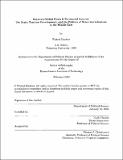| dc.contributor.advisor | Nazli Choucri. | en_US |
| dc.contributor.author | Hazbun, Waleed (Waleed Albert), 1968- | en_US |
| dc.contributor.other | Massachusetts Institute of Technology. Dept. of Political Science. | en_US |
| dc.date.accessioned | 2005-05-19T14:38:25Z | |
| dc.date.available | 2005-05-19T14:38:25Z | |
| dc.date.issued | 2002 | en_US |
| dc.identifier.uri | http://hdl.handle.net/1721.1/16800 | |
| dc.description | Thesis (Ph. D.)--Massachusetts Institute of Technology, Dept. of Political Science, 2002. | en_US |
| dc.description | "February 2002." | en_US |
| dc.description | Includes bibliographical references (p. 412-441). | en_US |
| dc.description | This electronic version was submitted by the student author. The certified thesis is available in the Institute Archives and Special Collections. | en_US |
| dc.description.abstract | This dissertation presents a new type of theory about the impact of increased transnational capital flows on state building processes. Most of the political science literature about globalization has been focused on debating the question of deterritorialization where the powers of territorial nation-states are viewed as being eroded by the increased transnational mobility of capital. This dissertation, in contrast, demonstrates how international tourism development-like many other aspects of globalization--can also produce "reterritorialization" characterized by the increased relevance of "place" for global economic activity. With increased globalization firms often seek to locate themselves in specific territories in order to capture what I call locational rents and external economies. In contrast to the dislocating effects of deterritorialization, reterritorialization can increase the political influence of state, societal, and transnational agents able to create localities that generate locational rents and external economies. The dissertation explores how states in the Middle East have promoted reterritorialization through tourism development in an attempt to enhance their control over capital and cultural flows as they promote economic liberalization and the incorporation of their economies into global markets. My fieldwork explored two national case studies with different configurations of territorial control. In Tunisia, I found that centralized state control over the territorially defined resources and institutions driving the reterritorialization process allowed the state to extend its control over transnational capital flows, the local private sector, | en_US |
| dc.description.abstract | (cont.) and the location of tourism development within Tunisia. In Jordan, by contrast, control over tourism spaces has been highly fragmented between rival state organizations, private firms and land holders, non-governmental organizations, and transnational actors such as environmentalists and heritage preservation experts. This situation has required the state to contend with societal resistance, organizational obstacles, and unfavorable bargains with societal actors. | en_US |
| dc.description.statementofresponsibility | by Waleed Hazbun. | en_US |
| dc.format.extent | 441 p. | en_US |
| dc.format.extent | 55450543 bytes | |
| dc.format.extent | 55450299 bytes | |
| dc.format.mimetype | application/pdf | |
| dc.format.mimetype | application/pdf | |
| dc.language.iso | eng | en_US |
| dc.publisher | Massachusetts Institute of Technology | en_US |
| dc.rights | M.I.T. theses are protected by copyright. They may be viewed from this source for any purpose, but reproduction or distribution in any format is prohibited without written permission. See provided URL for inquiries about permission. | en_US |
| dc.rights.uri | http://dspace.mit.edu/handle/1721.1/7582 | |
| dc.subject | Political Science. | en_US |
| dc.title | Between global flows & territorial control : the state, tourism development, and the politics of reterritorialization in the Middle East | en_US |
| dc.title.alternative | Between global flows and territorial control | en_US |
| dc.type | Thesis | en_US |
| dc.description.degree | Ph.D. | en_US |
| dc.contributor.department | Massachusetts Institute of Technology. Department of Political Science | |
| dc.identifier.oclc | 50483026 | en_US |
